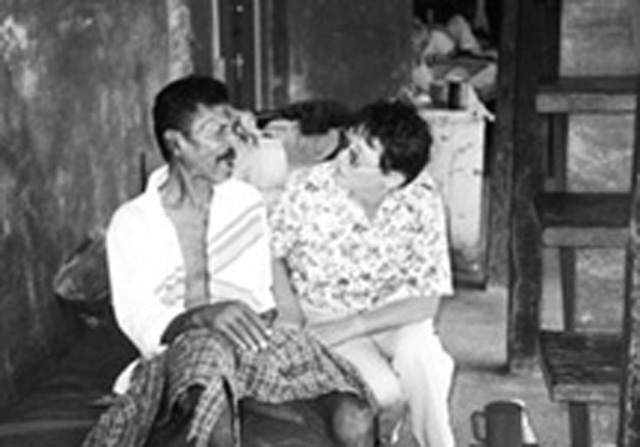THE RHYTHM OF MY DAYS
By Maggie Smith
October 2001
Return to Table of Contents
Print Article
Here in Guyana my time is shared in different areas, each enjoyable in its own way. Yet, if one area of my work can be said to engage my heart and mind more thoroughly, it is the time I spend as a volunteer at the National Psychiatric Hospital.
 (Credit Beverley Vantomme)
(Credit Beverley Vantomme)Scarboro lay missioner Maggie Smith, a registered practical nurse, visits with a resident at a Hindu shelter for the elderly in New Amsterdam, Guyana.
As its name suggests, this is the central institution for the mentally ill in Guyana. As such, it receives referrals from throughout the country. There are approximately 200 patients, two-thirds of whom are male.
The population is housed in ‘chalets’, long dormitory-like rooms accommodating 20-22 patients. The conditions are spartan—a bed and sometimes a table, with little opportunity for privacy and no place to display or keep any small treasure.
Most of my volunteer hours are spent in the occupational therapy department which is simply a large L-shaped space with concrete floors.
In one area the patients watch television and do handiwork. The other area holds several large tables and a few benches. It is here that I work with the patients. We play games, alternating between those that exercise the mind and those that exercise the body.
The patients are the reason this work is so gratifying. They are getting to know me and can greet me by name. I am usually met with hugs and kisses, which is a nice start to the day.
One of the most enthusiastic participants is Joyce. Although she uses a wheelchair and has a speech disability, she enters wholeheartedly into everything we do. She loves to play bingo and her delight when she wins is something to see.
I have named her “Bingo Queen” which pleases her to no end. After bingo we move to a beanbag toss to music. I call this Sweating to the Oldies, though perhaps it is only I who is doing the sweating as I am the only one running to retrieve the beanbag!
There are usually chronic patients sitting on one of the benches, seemingly oblivious to the world. Though they do not accept our invitation to join in, when the bag is thrown to them, they catch it, return it, and watch to see if it is coming back again. So even if it is only for a few moments, their attention is engaged, and in some small way they are part of the group.
Another favourite activity is table tennis. While it is difficult for Joyce to connect with the ball, she loves to try. When she manages to respond to my serve, her laughter and delight are very infectious. During the game many patients play as my partner, and while they only play for a short time, any participation is encouraged.
In all of this it is more difficult to engage the male patients, but sometimes a modified game of yahtzee or a game of dominos will attract them.
Another of my most willing participants in any and all activities is Marilyn. Weather permitting, I take one or two patients to town, trying to keep a legitimate errand for this outing, to give my companions a taste of normal everyday activities. Afterwards, we indulge in a treat of ice cream or soda. Marilyn is most helpful when it comes to pushing the wheelchairs.
Thanks to the generosity of a Catholic Women’s League in Charlton Kings, England, we now have some outdoor sports equipment. During a recent stay, Canadian volunteers took part in a volleyball game with the patients, and with their enthusiastic help many patients were able to take part.
Much more could be done to make life more enjoyable for the patients, but as always it takes many hands and there is a shortage of staff. The full complement of occupational therapy staff is meant to be three, but there is usually only myself and one other nurse. Since staff can be transferred indiscriminately between government-run hospitals, many have no psychiatric training.
The department head is conducting classes on an ongoing basis to address this lack, as she is fiercely committed to the care of the mentally ill. Her vision is of well-trained staff facilitating the return to the community of many patients, so that with help, they could once more take their place in society.
This, then, is the rhythm of my days at the National Psychiatric Hospital; nothing earth-shaking, but strangely satisfying.
Return to Table of Contents
Print Article